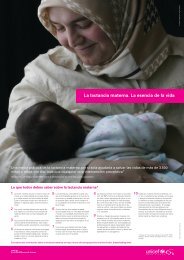SEXUAL ABUSE AND EXPLOITATION OF BOYS IN SOUTH ASIA A ...
SEXUAL ABUSE AND EXPLOITATION OF BOYS IN SOUTH ASIA A ...
SEXUAL ABUSE AND EXPLOITATION OF BOYS IN SOUTH ASIA A ...
Create successful ePaper yourself
Turn your PDF publications into a flip-book with our unique Google optimized e-Paper software.
Sexual Abuse and Exploitation of Boys in South Asia<br />
A Review of Research Findings, Legislation, Policy<br />
and Programme Responses<br />
John Frederick a<br />
a Child Protection Consultant, UNICEF Innocenti Research Centre,<br />
<br />
Summary: This paper provides an overview of research findings, legislation, policy and programme<br />
responses to prevent and respond to the sexual abuse and exploitation of boys in South Asia. The<br />
background to the paper is based on the findings from previously conducted UNICEF IRC research<br />
on child trafficking in the region, in which it was indicated that boys enjoy less legal protection than<br />
girls from sexual abuse and exploitation and less access to service for victims. While it is seen that<br />
the majority of legislation and policies that address ‘children’ adequately address ‘boys’, this paper<br />
notes areas in which the rights and needs of boys require greater focus. Among the concerns is the<br />
absence of legal commentary on legislation regarding boys’ issues and an absence of advocacy efforts<br />
to take action and amend laws to provide equal protection to boys. In some cases legislation covers<br />
only girls and women. And, although research shows that boys face nearly the same degree of sexual<br />
abuse and exploitation as girls, programming throughout the region is overwhelmingly directed at<br />
girls and women.<br />
Evidence-based information is lacking on the sexual abuse of both boys and girls and on the sexual<br />
exploitation of boys. The majority of studies to date have emphasized trafficking for sexual<br />
exploitation and have been focused on women and girls. Research on trafficking has concentrated on<br />
recruitment, transportation and sale of victims; little research has been conducted on the subsequent<br />
situations of exploitation into which children are trafficked.<br />
Some countries in South Asia are beginning to fill the knowledge gap regarding both child sexual<br />
abuse and sexual exploitation of boys. The information that is presented was mainly gathered in<br />
2008, but it remains limited by the sources available, some of which date back several years<br />
previously. The findings are however considered to be relatively robust and consistent. The report<br />
presents concrete recommendations for strengthening legislation, policy and programmes to address<br />
this issue from a child rights based approach. It highlights that listening to boys and girls and learning<br />
from their experiences and recommendations are key to designing and implementing effective<br />
preventive and protective mechanisms.<br />
Keywords: sexual exploitation, child sexual abuse, child trafficking, boys in South Asia<br />
Acknowledgments: This paper was developed in its present form through the encouragement of<br />
Lena Karlsson, UNICEF IRC, who discussed with the author the need for a basic ‘reference manual’<br />
on the sexual abuse and exploitation of boys in South Asia that could serve as a foundation for<br />
further research, policy development and programming. This review owes its substance, and<br />
particular thanks are given, to the fine researchers and research organizations who have studied these<br />
issues throughout the sub-continent. These include, among many, AIHRC and ACBAR in<br />
Afghanistan; ACD, BIDS, Therese Blanchet, BTS, <strong>IN</strong>CID<strong>IN</strong> and Global Poverty Research Group in<br />
Bangladesh; Equations, Sanlaap, S. L. Akula, Agniva Lahiri, Sunil Menon and P. Virani in India;<br />
CPCS, CW<strong>IN</strong>, G. Subedi, WOREC, CAC, Kathmandu School of Law, New ERA and K. Kansakar in<br />
Nepal; Pakistan Paediatric Association, Pakistan Voluntary Health and Nutrition Association, PILER,<br />
Aangan/Rozan, Sahil, Azad Foundation, Anusheh Hussain, SPARC and S. Munir in Pakistan;<br />
Harendra de Silva, S. Amarasinghe, LHRD, PEACE, A. Zulfi and MG Consultants in Sri Lanka; and<br />
Ratna Kapur, Turid Heiberg, Ravi Karkara, Jyoti Sanghera and Cathy Slugget for their regional<br />
analyses.<br />
v










